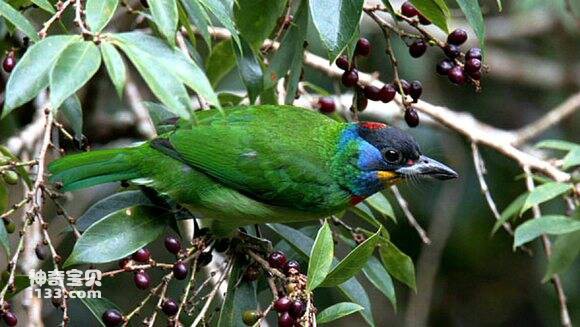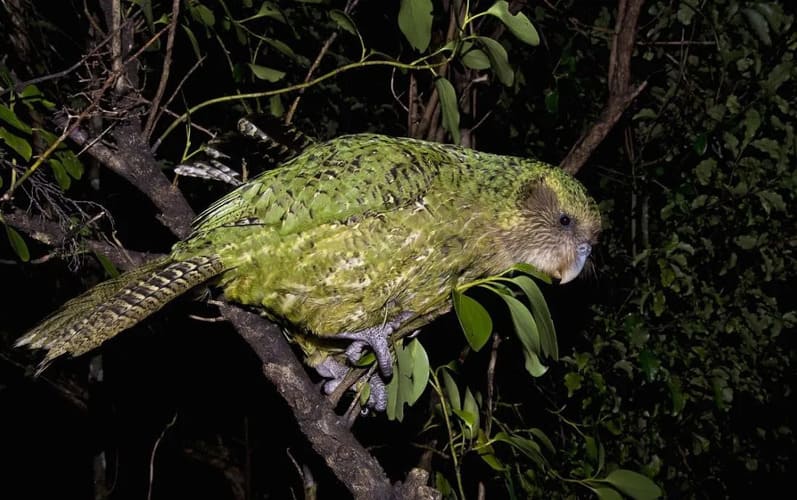Psilopogon oorti
IUCN
LCBasic Information
Scientific classification
- name:Psilopogon oorti
- Scientific Name:Psilopogon oorti,Megalaima faber,Chinese Barbet
- Outline:Climbing birds
- Family:
Vital signs
- length:19-24cm
- Weight:69-118g
- lifetime:No textual research information is available
Feature
With thick black brow lines
Distribution and Habitat
Picoides Sinensis distributed in Guangxi, Hainan Island and Taiwan in China. Outside China, it is distributed in Laos, Indochina Peninsula, Indonesia and Malaysia.
Chinese Woodpecker mainly lives in evergreen broad-leaved forests and secondary forests in the middle and low mountains and the plain at the foot of mountains below 2500 meters above sea level.
Appearance
Picoides sinensis has a red forehead, or a black forehead and crown, and a scarlet pillow (Hainan subspecies) or a yellow forehead, and a blue crown (Taiwan subspecies). The eyes have black stripes, the eyebrows are black, and the eyes have red spots first (Hainan subspecies and Taiwan subspecies). Neck side and ear cover blue, nape, back, waist and tail green. The feathers are black, the outer fringe is slightly blue, and the inner fringe is egg yellow. The chin and upper throat are golden yellow, the lower throat and side of the neck are blue, forming a blue neck ring, with a bright red spot or band under it, and the chest, abdomen and the rest of the lower body are yellowish-green. The irises are reddish-brown, the mouth thick, lead-black, and the feet dark gray.
Size measurement: weight 85-118 grams, ♀69-118 grams; Body length 207-246 mm, ♀199-245 mm; Rostral peaks are 25-28 mm, ♀24-28 mm; Wing ♂98-110 mm, ♀94-106 mm; Tail ♂ 57-75mm, ♀ 58-75mm; Tarsus 26-29 mm, ♀24-29 mm.
Details
Psilopogon oorti, Megalaima faber, Chinese Barbet, has 4 subspecies (1. Central South subspecies of Woodpecker: Psilopogon oorti annamensis. 2. Psilopogon oorti faber, Hainan subspecies. 3. Named subspecies: Psilopogon oorti oorti. 4. Psilopogon oorti sini, Guangxi subspecies.) .

Picoides sinensis is a resident bird, often living alone or in small groups. Live in the upper or treetops of trees, do not move. It can only fly short distances and cannot carry out sustained flight activities for a long time. They live in tree holes at night. The sound is monotonous and loud, often repeated, its sound is like "gar, gar" or "Luo, luo, luo", a bit like the wooden fish sound of monks chanting sutras. It mainly feeds on plant fruits and seeds, but also eats a small amount of animal food such as insects。

The breeding period of the Chinese Woodpecker is from April to June. Nest in the hole of the tree, each clutch lays 3 eggs, the eggs are white.
Picoides sinensis has a narrow distribution area and a small population in China. In May 2022, at the top of Malu Mountain in Liuzhou City, a photographer captured the Chinese woodpecker with his lens.
It was included in the List of Beneficial Terrestrial Wildlife under State Protection or of Important economic and scientific research Value issued by the State Forestry Administration of China on August 1, 2000.
Listed on the IUCN Red List of Threatened Species (IUCN 2016 ver 3.1) - Not Threatened (LC).
Protect wild animals and eliminate wild meat.
Maintaining ecological balance is everyone's responsibility!








